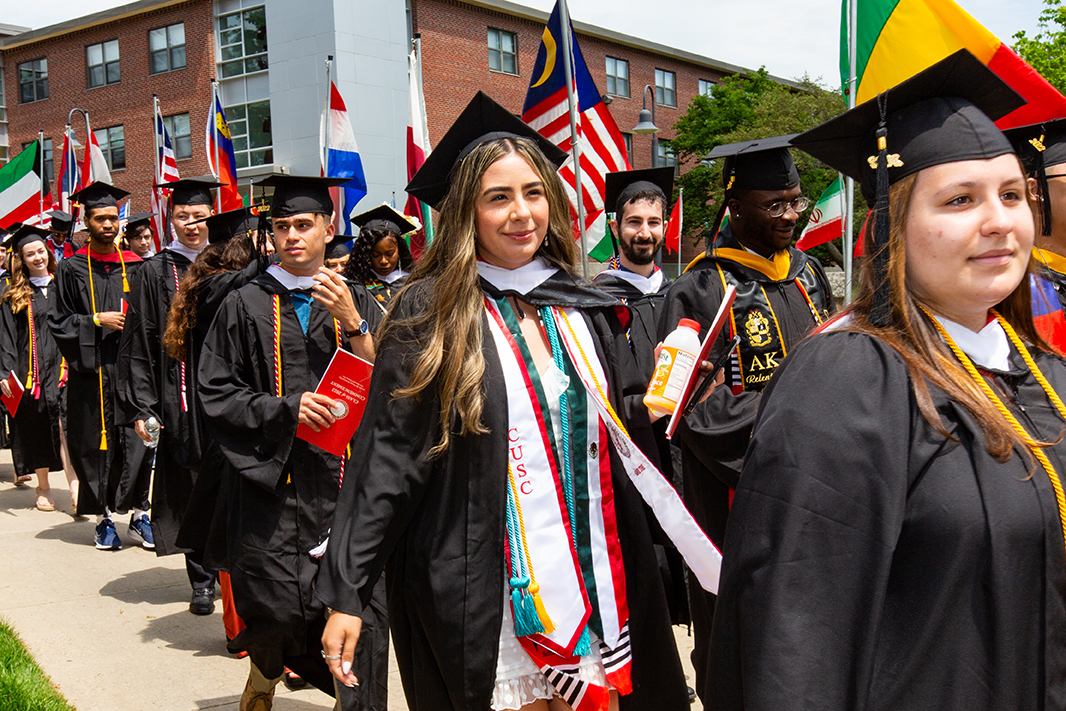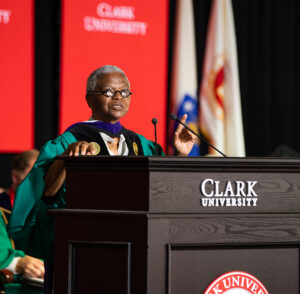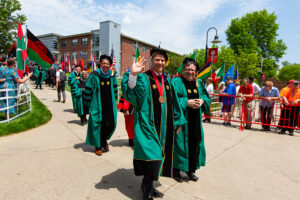‘There comes a time when one must take a position because it’s right’

Clark University students were urged to always ask questions, move forward with confidence, and have the moral clarity to make courageous and meaningful decisions during the 118th Commencement on the Campus Green today. Clark awarded 577 bachelor’s, 489 master’s, and 25 doctoral degrees.
Under a tent that offered respite from unseasonably warm temperatures, Ross Gillman ’81, chair of the Board of Trustees, introduced President David B. Fithian ’87, who implored the graduates to always be curious.
“You came to Clark looking for answers — about subjects that interest you, about yourself, and about the world — and I hope you found some,” he said. “But as you leave here, I hope Clark has helped you to ask more, different, and better questions. Every question is a chance to hear something you may never have heard before. This iterative process of questions and answers is crucial to your lifelong journey of learning and will enrich your life at every stage along that path.”
Fithian recognized the tenacity of the graduating class, who navigated disruptions brought by the COVID-19 pandemic during their Clark journey.
“While I wish your experience here was different, I nonetheless believe you may extract from what it was a strength of spirit and resolve that is extraordinary and useful. I also hope that it reinforced your own sense of what you are capable of overcoming and achieving,” Fithian said.

Mary Frances Berry, a renowned scholar, civil rights activist, and the Geraldine R. Segal Professor Emerita of American Social Thought at the University of Pennsylvania, delivered the commencement address. Berry told the graduates that they have a moral obligation to contribute to society.
“You should above all else, no matter what else goes on around you, hold on to ideas you consider worthy and discard those that are not, and you should develop the wisdom to know the difference,” she said.
Berry noted that the consequential challenges facing younger generations — from the persistence of systemic racial, economic, and educational disparities to the worsening impacts of global climate change — require a forceful and courageous response.
“There comes a time when one must take a position that is neither safe, nor politick, nor popular, but you must take it because it is right,” she insisted.
“You graduates,” she continued, “must realize, as you become alumni, that the next generations of students will join in community to challenge and continue to attack the systems of discrimination and color line until we accept the consequences of our history and find consensus for a better future.”
She recalled the words of the late Benjamin Mays, the former president of Morehouse College and a mentor to Dr. Martin Luther King, with whom she would engage in discussions about the civil rights movement. “It’s not a disgrace if you don’t reach the stars,” she remembers Mays saying, “but it is a disgrace to have no stars to seek. Not failure, but low aim is the tragedy.”
In addition to Berry, honorary degrees were granted to David P. Angel, who led Clark as its ninth president (2010 to 2020) and whose academic and administrative career at the University spanned 33 years; Annette Gordon-Reed, the Carl M. Loeb University Professor at Harvard University whose Pulitzer Prize-winning book “The Hemingses of Monticello” forced a reconsideration of accepted historical narratives; and Doug Wright, the playwright, librettist, and screenwriter whose works include “I Am My Own Wife,” which won the Tony Award and Pulitzer Prize.
A special salutation was reserved for the Class of 2020, who were just six weeks shy of Commencement when the pandemic cut short their in-person college experience and necessitated a virtual ceremony. Members of that class were invited back to Clark this weekend to celebrate together at a special event.
Julia Chun ’22, who earned her bachelor’s degree in geography with a concentration in law and society, addressed her fellow undergraduates, encouraging them to move forward resolutely in a world that is not always receptive to change.
“Moral courage is not being the loudest person in the room. It is also not about being diplomatic and having one foot in and one foot out,” said Chun, who is pursuing a master of arts in public administration through Clark’s Accelerated Degree Program. “It’s about fully committing yourself to paying attention to the world around you and the multitude of realities that exist.”
Erica Pellegrino ’21, MSC ’22, in a speech to graduate students, urged her peers to be gentle with themselves when they make mistakes.
“I’ve always believed growth doesn’t come from our experiences themselves, but rather from how we respond to them. If that’s true, then our time in graduate school doesn’t wholly define our character, but rather simply serves as a catalyst for our development in the future to come,” said Pellegrino, who received a master of science in communication.
Sebastián Royo, provost and vice president for academic affairs, told the graduate students that they leave Clark with the skills to make good on the University’s motto: “Challenge Convention. Change our World.”
He encouraged graduates to savor the moment and celebrate their accomplishments.
“There have been many moments in the past leading up to this moment, and there will be many in the future as you each take your individual pathways,” he said. “This moment we get to enjoy and celebrate here together.”

Fithian, speaking from experience as an alumnus, said students will recall lessons and memories from Clark throughout their lives, sometimes when they least expect it. In turn, the skills and values they developed at Clark will serve the greater good in the years ahead.
“Today’s world needs Clarkies. Today’s world needs minds that can appreciate and synthesize a variety of perspectives. Today’s world needs individuals who can think critically and creatively, who value research-based and evidence-informed solutions to complex problems. Today’s world needs people who aren’t afraid to be themselves, and who aren’t afraid to challenge convention, and work to break free of the status quo.
“Alongside all of this, today’s world needs — desperately needs — people with heart,” he said. “Today’s world needs you.”


